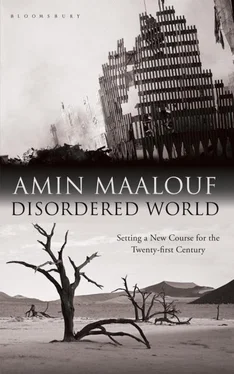When it came to Christian minorities, their situation was never idyllic, but they generally managed to survive and prosper whatever the regime and even prosper. At no time since the birth of Islam have they felt themselves as marginalised, oppressed and even forced out as they do today in Iraq and some other countries. Having become strangers in their own land, despite living there for centuries and sometimes even millennia, several of these communities will disappear in the course of the next twenty years, without it causing much distress among their Muslim compatriots or their fellow Christians in the West.
As for the Jewish communities of the Arab world, their extinction is already a fait accompli. There remain only here and there a few stoical survivors whom the authorities and populace continually humiliate and persecute.
But, one might object, do Israel and the US not bear some responsibility for this state of affairs? Yes, probably, but that is a shabby excuse for the Arab world to fall back on. Let us return to the example of Iraq. I believe that the erratic behaviour of the American occupier has contributed to plunging the country into intercommunal violence. I am even ready to admit, even though such cynicism strikes me as monstrous, that a few sorcerer’s apprentices in Washington and elsewhere may have benefited from this bloodbath. But when a Sunni militant gets behind the wheel of a truck packed with explosives and detonates it in a marketplace full of Shia families and this mass murder is called ‘resistance’, and its perpetrator a hero or martyr by certain fanatical clerics, there is no point in blaming others; it is the Muslim world itself which needs to examine its conscience. What struggle is it engaged in? What values is it defending? What meaning does it accord its beliefs?
The Prophet is reported to have said: ‘The best of men is the one who is most useful to his fellow men.’ It is a powerful motto which sought to provoke some soul-searching among individuals, leaders and peoples: what are we contributing to others and to ourselves? In what way are we ‘useful’ to our fellow men? Are we guided by something other than suicidal despair, which is the worst form of sacrilege?
The West, the other civilisation to which I belong, has a different predicament from that of the Arab world, since it remains the model or at least the principal point of reference for all of humanity. Yet it too finds itself in a historic impasse today which is affecting its behaviour and contributing to a disordered world.
If, at the beginning of this century, there is a nagging ‘Eastern question’ which doesn’t always seem as though it is progressing towards resolution, there is also undeniably a ‘Western question’. And if the tragedy of the Arabs is that they have lost their place among nations and feel unable to recover it, the tragedy of the West is to have assumed too large a global role, which it can no longer entirely fulfil but from which it cannot extricate itself.
It goes without saying that the West has given humanity more than any other civilisation. Since the Athenian miracle two and a half thousand years ago, and especially in the course of the last six hundred years, there is not a field of knowledge, creativity, production or social organisation which — for better or for worse — does not bear the stamp of Europe or its North American offshoot. Western science has become science tout court ; Western medicine is medicine, just as Western philosophy is synonymous with philosophy. Its various doctrines, from the most liberating to the most totalitarian, have been recreated under distant skies. Even those who fight against Western dominance do so with physical and intellectual tools which the West invented and spread around the rest of the world.
With the end of the Cold War, Western hegemony seemed to have crossed a new threshold. Its economic, political and social systems had demonstrated their superiority and appeared to be on the point of encompassing the whole world. There was even some premature talk of ‘the End of History’, since the whole world was now going to melt peacefully into the mould of the victorious West.
But History is not the wise and biddable virgin of ideologues’ dreams.
And so in the field of economics, the triumph of the Western model has led paradoxically to a weakening of the West.
Freed from the shackles of central planning, China and then India’s economies rapidly took off; these were two peaceful revolutions which were brought about quietly by unassuming people, but they are in the process of permanently changing the balance of the world.
In 1978, two years after the death of Mao Zedong, power fell to Deng Xiaoping, a little 74-year-old man who had miraculously escaped the purges of the Cultural Revolution. He immediately ordered the distribution of previously collectivised land to some of the peasants and allowed them to sell a proportion of their harvest. The results were convincing: productivity increased two-, three- and in some cases fourfold. Going further, the Chinese leader decided that, rather than being told by the local authorities, the peasants could henceforth choose for themselves what to plant. Production increased again. And so it began. By small steps and without earth-shattering declarations or mass demonstrations, the old unproductive system was progressively dismantled, progressively and yet at the speed of light, probably through the multiplier effect resulting from the size of the country’s population. For example, when the authorities lifted the ban on small family businesses in the countryside — such as grocers’, stalls and repair shops — twenty-two million of them sprang up, employing thirty-five million people. When it comes to China, one constantly has the impression of turning the pages of a book of records: for example, the number of skyscrapers in Shanghai in 1988 was fifteen, but within twenty years it had risen to five thousand — more than New York and Los Angeles combined.
But there are phenomena which do not depend on a giant scale, and which may even be made more difficult by it, such as the growth in GDP, which has hovered around an average of 10 per cent for thirty years, enabling the Chinese economy to overtake successively those of France, the UK, and then Germany in the first decade of the twenty-first century.
In India, the dismantling of the planned economy took place just as calmly and with consequences that were equally astonishing. In July 1991, the Indian government had to face a major financial crisis which threatened imminent bankruptcy. In response, the finance minister Manmohan Singh decided to relax some of the restrictions which hampered business. Up to that point, the country had had extremely restrictive laws which obliged businesses to obtain a permit for every transaction: import permits, foreign exchange permits, investment permits, permits to increase production, and so on. As soon as the economy was freed from these shackles, it took off.
What I have described in a few brief paragraphs constitutes a huge and unexpected advance for the whole of humanity, one of the most exciting in history. The two most populous countries on the planet, accounting for half of what we used to call the Third World, are beginning to emerge from underdevelopment. Other countries in Asia and Latin America seem to be following suit. The traditional division of the world into the industrial North and the impoverished South is gradually fading.
In retrospect, the economic rise of these great Eastern nations will probably appear the most spectacular consequence of the collapse of state socialism. Viewing it from the perspective of humanity as a whole, one can only applaud. Seen from a Western standpoint, the joy is mixed with apprehension, for these new industrial giants are not only business partners; they also represent formidable rivals and potential enemies.
Читать дальше












